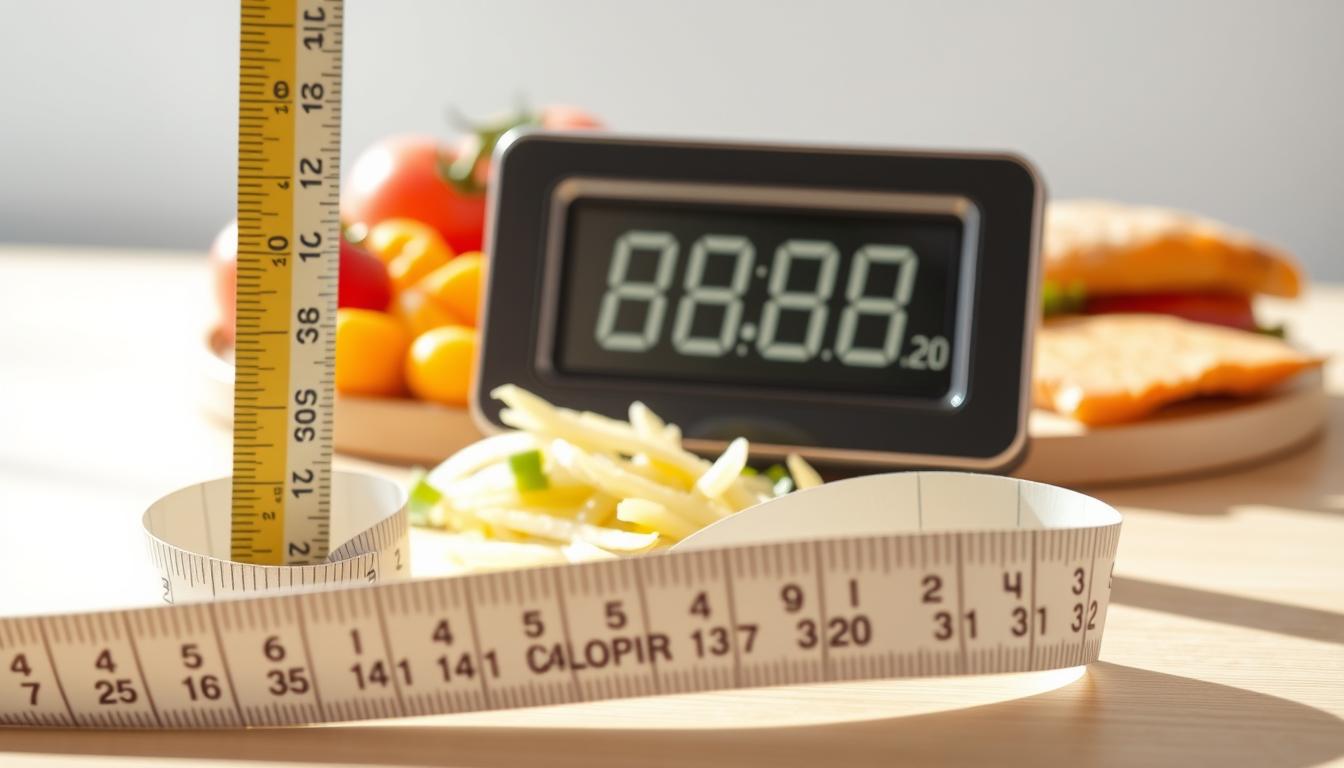“You don’t have to be great to start, but you have to start to be great.” – Zig Ziglar. This motivational quote resonates perfectly with the journey of weight loss, where the first step is understanding your calorie needs.
To achieve weight loss, it’s crucial to grasp the science behind your daily calorie intake. The balance between calories consumed and calories burned determines your weight management.
We will explore how to determine your personal calorie needs based on scientific formulas and individual factors, empowering you to make informed decisions about your nutrition and exercise habits.
Key Takeaways
- Understanding the science behind calorie intake is crucial for effective weight loss.
- Your daily calorie needs depend on various individual factors.
- Creating a calorie deficit is key to healthy and sustainable weight loss.
- Using a calorie calculator can help determine your daily calorie intake.
- Aiming for a gradual weight loss is more likely to result in long-term success.
Understanding Calories and Weight Loss
Calories are the fundamental units of energy that our bodies need to function, and grasping their significance is key to losing weight. Simply put, a calorie is a unit that measures energy. Calories measure the energy content of foods and beverages.
To lose weight, you need to eat fewer calories than your body burns each day. Conversely, you need to consume more calories than you expend to gain weight. This principle is based on the concept of energy balance, where the calories you consume are either used by your body for various functions or stored as fat.
The fundamental principle of weight loss is creating a calorie deficit, where you consume fewer calories than your body burns. Your body uses calories for basic functions such as breathing, circulation, cell production, nutrient processing, and temperature regulation. Excess calories are stored as fat, leading to weight gain.
Understanding the relationship between calorie intake and weight loss helps create realistic expectations about your weight loss journey. Different types of calories (from proteins, carbs, and fats) affect your body differently. For instance, proteins require more energy to process than carbohydrates or fats, which can influence your overall calorie expenditure.
The “calories in, calories out” principle is foundational, but other factors also influence weight loss. These include your metabolic rate, the composition of your diet, and your level of physical activity. By understanding how these factors interplay, you can develop a more effective strategy for losing weight.
In summary, managing your daily calorie intake is crucial for weight loss. By creating a calorie deficit and understanding how different calories affect your body, you can achieve your weight loss goals more effectively.
Factors That Affect Your Calorie Needs
Your body’s calorie requirements are influenced by a multitude of factors. At its core, our body needs a basic amount of energy to function, known as the basal metabolic rate (BMR). However, other factors on top of the BMR can significantly influence our overall calorie needs.
According to the Dietary Guidelines for Americans, daily calorie needs vary based on many factors, including age, sex, height, weight, physical activity level, and pregnancy or lactation status. Age plays a significant role in determining calorie needs; as we age, our metabolism slows down, and our calorie requirements typically decrease.
Sex differences also play a crucial role in calorie needs. Generally, biological males require more calories than females due to differences in body composition and metabolic rate. For instance, men usually have more muscle mass than women, which requires more energy to maintain.
Our current weight and height are also critical factors that affect our BMR and daily calorie requirements. A larger body size requires more energy to maintain basic bodily functions. Furthermore, physical activity level is perhaps the most variable factor in determining calorie needs. Individuals with more active lifestyles require more calories to support their energy expenditure.
Additionally, health conditions, medications, and hormonal factors can influence calorie requirements. For example, certain medical conditions can increase metabolism, while others may decrease it. Understanding these factors helps us calculate a more accurate and personalized calorie target for weight loss.
As
“The key to successful weight loss is not just cutting calories, but understanding and addressing the factors that influence your calorie needs.”
By considering these factors, we can develop a more effective weight loss strategy tailored to our individual needs.
In conclusion, calorie needs are highly individualized and depend on a variety of factors. By understanding how age, sex, weight, height, physical activity, and health conditions affect our calorie requirements, we can better plan our diet and exercise regimen to achieve our weight loss goals.
How to Calculate Daily Calorie Intake for Weight Loss
To achieve your weight loss goals, understanding how to calculate your daily calorie needs is essential. The first step involves determining your Basal Metabolic Rate (BMR), which is the number of calories your body needs at complete rest. The Mifflin-St. Jeor equation is considered one of the most accurate methods for calculating BMR. It takes into account factors such as age, sex, height, and current weight.
Your BMR is just the starting point. To get a more accurate picture of your daily calorie needs, you need to factor in your activity level to determine your Total Daily Energy Expenditure (TDEE). TDEE accounts for the calories you burn during physical activity, including exercise and other daily movements. Understanding how to adjust your calorie intake based on your activity level is crucial for effective weight loss.
Once you have your TDEE, you can create a calorie deficit by consuming fewer calories than your body burns. The goal is to lose weight at a sustainable rate of 1-2 pounds per week. To achieve this, you’ll need to reduce your daily calorie intake by 500-1000 calories. However, creating too large of a calorie deficit can be unsustainable and may lead to nutrient deficiencies.
The Mifflin-St. Jeor equation provides a scientific approach to calculating your calorie needs. For men, the equation is: BMR = (10 x weight in kg) + (6.25 x height in cm) – (5 x age in years) + 5. For women, it’s: BMR = (10 x weight in kg) + (6.25 x height in cm) – (5 x age in years) – 161. After calculating your BMR, you can multiply it by an activity factor to get your TDEE.
Activity levels are categorized as sedentary, lightly active, moderately active, very active, and extra active. Each category has a corresponding multiplier that you apply to your BMR to estimate your TDEE. For example, if you’re moderately active, you might multiply your BMR by 1.55.
As noted by a health expert, “A well-planned calorie deficit is key to successful weight loss.” By understanding your daily calorie needs and creating an appropriate deficit, you can achieve your weight loss goals. It’s also important to monitor your progress and adjust your calorie intake as needed.
Recommended Calorie Intake by Age and Sex
The number of calories an individual needs varies significantly based on age and sex, making it essential to understand these differences for effective weight loss. Generally, the recommended daily calorie intake is tailored to an individual’s age and sex to ensure they meet their nutritional needs while maintaining a healthy weight.
For women, the daily calorie needs vary across different age groups. Females aged 19-30 years require about 2,000-2,400 calories per day to maintain their weight. Those between 31-60 years need 1,600-2,200 calories, while women aged 61 and above require 1,600-2,000 calories daily. For men, the calorie needs are higher. Males aged 19-30 years need approximately 2,400-3,000 calories daily, those between 31-60 years require 2,200-3,000 calories, and men aged 61+ years need 2,000-2,600 calories.
As noted by a health expert, “
Understanding your daily calorie needs is the first step towards a healthier lifestyle and successful weight loss.
” These are general guidelines and should be adjusted based on individual factors such as activity level and specific health conditions.
To achieve weight loss, one must consume fewer calories than their maintenance level. For both men and women, reducing daily calorie intake by 500 calories can lead to a weight loss of about 1 pound per week, which is a safe and sustainable rate.
It’s crucial to understand that these are general recommendations. Individual calorie needs may vary based on factors such as physical activity level, overall health, and specific dietary needs. Therefore, these guidelines serve as a starting point that should be personalized.
In conclusion, understanding the recommended daily calorie intake by age and sex is vital for setting realistic weight loss goals. By knowing how many calories you need per day, you can plan your diet more effectively.
Using Online Calorie Calculators
Using online calorie calculators is an efficient method to determine your daily calorie intake for effective weight loss. These tools simplify the process by quickly processing multiple variables to provide a personalized calorie target.
Online calorie calculators can be highly beneficial in several ways:
- They simplify the process of determining your daily calorie needs by considering various factors such as age, sex, weight, height, and activity level.
- They provide a quick and personalized calorie target for weight loss, helping you set realistic goals.
To get the most out of online calorie calculators, it’s essential to select reliable ones that use scientifically validated formulas. Reliable calculators can make a significant difference in achieving your weight loss goals.
Here’s a comparison of some popular online calorie calculators:
| Calculator | Features | Scientific Basis |
|---|---|---|
| Calculator 1 | Daily calorie intake, macronutrient breakdown | Yes |
| Calculator 2 | Calorie deficit planning, meal planning | Yes |
| Calculator 3 | Basic calorie needs calculation | No |
Understanding the limitations of these calculators is also crucial. They should be used as tools rather than definitive answers. We recommend interpreting the results and adjusting them based on your real-world progress.
By using online calorie calculators regularly, you can adjust your calorie intake as your weight and activity levels change. This helps in maintaining a consistent progress towards your weight loss goals.
5 Effective Strategies to Reduce Calorie Intake
Effective weight loss often involves reducing calorie intake through a combination of dietary changes and lifestyle adjustments. To achieve this, we can implement several strategies that not only help in losing weight but also in maintaining overall health.
One of the most effective ways to reduce calorie intake is by increasing protein consumption. Protein takes more energy to digest than carbohydrates or fat, which can increase our metabolism and help us feel fuller for longer. Research has shown that a higher protein diet can significantly aid in weight loss by reducing hunger and preserving muscle mass.
Another crucial strategy is limiting sugary beverages. Drinks like soda, sports drinks, and sweetened teas or coffees are high in calories and added sugars but low in nutritional value. Our brains don’t register liquid calories the same way as solid food calories, leading to overconsumption. Switching to water or unsweetened beverages can significantly reduce our overall calorie intake.
Drinking water before meals can also help reduce calorie intake. Studies have found that people who drink water before meals tend to eat fewer calories. This simple habit can lead to significant weight loss over time.
Regular exercise, especially resistance training, is vital for maintaining muscle mass while on a calorie-restricted diet. Exercise not only burns calories but also helps in building muscle, further supporting weight loss efforts.
Reducing refined carbohydrates and processed foods is another effective strategy. These foods are typically high in empty calories, added sugars, and unhealthy fats. By focusing on whole, nutrient-dense foods, we can better manage our calorie intake and support our overall health.
| Strategy | Description | Benefit |
|---|---|---|
| Increase Protein Intake | Eat more protein-rich foods like lean meats, fish, eggs, tofu, and legumes. | Reduces hunger, preserves muscle mass. |
| Limit Sugary Beverages | Switch from sugary drinks to water or unsweetened beverages. | Reduces calorie intake from liquids. |
| Drink Water Before Meals | Have a glass of water before each meal. | Reduces hunger, lowers calorie intake. |
| Exercise Regularly | Engage in physical activities, including resistance training. | Burns calories, builds muscle. |
| Reduce Refined Carbs and Processed Foods | Focus on whole, nutrient-dense foods. | Lowers intake of empty calories, supports overall health. |
By incorporating these strategies into our daily routine, we can effectively reduce our calorie intake and achieve our weight loss goals in a sustainable manner.
Creating a Sustainable Calorie Deficit
Creating a calorie deficit that is sustainable over time is key to achieving and maintaining weight loss. A common assumption is that a deficit of 3,500 calories will lead to the loss of 1 pound of body weight, though research suggests this rule of thumb overpredicts weight loss.
To achieve a sustainable weight loss, we recommend aiming for a calorie deficit of about 200-500 calories per day. This deficit adds up to one or two pounds per week, considered a healthy and sustainable rate of weight loss.
Setting realistic weight loss goals is crucial. We will discuss how to promote sustainable progress rather than quick but temporary results. A moderate calorie deficit leads to a steady weight loss, which is more likely to be maintained over time.
| Calorie Deficit per Day | Projected Weight Loss per Week |
|---|---|
| 200 calories | 1 pound |
| 500 calories | 2 pounds |
Extreme calorie restriction often backfires and leads to weight regain. Understanding how to adjust your daily calorie intake over time is crucial as your body adapts to weight loss. We will provide strategies for overcoming weight loss plateaus by making appropriate adjustments to your calorie deficit.
Creating a sustainable plan involves finding nutritious foods that satisfy you while staying within your calorie goals. For more information on effective weight loss strategies, visit our page on BMI weight loss strategies.
Balancing social events, holidays, and special occasions while maintaining your overall calorie deficit is also important. By being mindful of your calorie intake and making informed choices, you can enjoy these events without derailing your weight loss progress.
Potential Downsides of Counting Calories
While counting calories can be a useful tool for managing weight, it’s crucial to be aware of its potential downsides. Although it can be an effective strategy for weight loss, research indicates that it may also have negative consequences, particularly if taken to extremes.
For some individuals, tracking daily calories can lead to an unhealthy relationship with food. Focusing solely on calorie intake might result in nutritionally poor choices if the nutrient density of the food is ignored. This oversight can impact overall health and nutrition.
Eating too few calories can also have adverse effects, such as slowing down one’s metabolism. This makes it more challenging to maintain weight loss in the long term. Moreover, for some people, the task of counting calories becomes overly time-consuming and stressful, ultimately reducing their quality of life.
It’s essential to consider alternative approaches to weight loss and diet that don’t require strict calorie counting. Understanding the potential psychological impacts of this practice can help determine if it’s the right approach for you.
By being aware of these potential downsides, individuals can make informed decisions about their eating habits and overall health. It’s about finding a balance that supports sustainable weight loss and nutritional well-being.
Making Your Weight Loss Journey Successful
The key to a successful weight loss journey lies in understanding that it’s not just about cutting calories, but about adopting a healthier lifestyle.
We provide practical tips for maintaining motivation throughout your weight loss journey, helping you stay on track even when progress slows.
Understanding that weight loss isn’t linear is crucial; it helps manage expectations and prevents discouragement when progress isn’t as rapid as desired.
Focusing on non-scale victories and overall health improvements is vital, as weight loss is just one aspect of a healthier you.
Creating sustainable habits around food and exercise is more important than short-term calorie restriction. We’ll explain how to transition from active weight loss to weight maintenance by gradually increasing calories per day.
Finding support and losing 1-2 pounds per week can lead to substantial weight loss over time.


